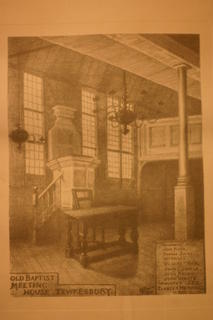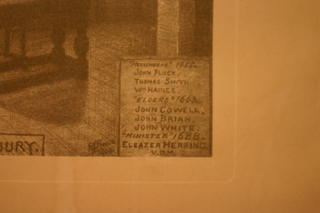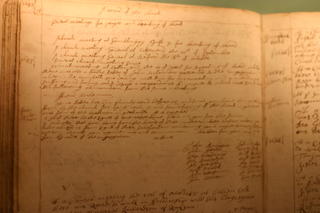Two recent books have taken up the question of how churches ought to be led, Who Runs the Church and Perspectives on Church Government. I’m a Baptist, so my main interest is in the arguments in these books as to whether congregational churches ought to be led by a single elder or a plurality of elders.
The best argument for the single elder view is based on the nature of the churches described in the NT. This view holds that, for instance, in Acts 20:17 when Paul summons the elders of the church in Ephesus, what Luke has in view is not a single church in Ephesus that has a plurality of elders but a multitude of house churches, each of which has one elder. In summoning the elders of Ephesus, Paul is summoning all the pastors of these various house churches. This way of understanding the churches in the NT is then used as a grid through which all of the texts referring to multiple elders are read.
I don’t think this view works because I don’t think it does justice to two texts: Acts 14:23 and James 5:14. If the "single elder in each house church making up a plurality in a city" view doesn’t work in these two texts, all the other texts that speak of elders in the plural should probably be read as single churches that have multiple elders—including Acts 20:17 (see also Phil 1:1; 1 Tim 4:14; 5:17; Tit 1:5; 1 Pet 5:1, 5).
In Acts 14:23 we read that as Paul and Barnabas made their way back to Antioch in Syria from their first missionary journey, "they appointed for them elders according to church." I have rendered this very literally to bring out the sense of the text, which is that each church (sg.) had elders (pl.). This is usually translated, "they appointed elders for them in every church," which makes the same point. Luke does not say that they appointed elders in every town, which would support the single-elder position. He says that in each church (sg.) elders (pl.) were appointed.
In James 5:14 we read, "If someone is sick among you, let him call the elders of the church and let them pray over him, anointing him with oil in the name of the Lord." I find it highly unlikely that a sick member of a certain church should summon pastors from different churches in his city. It seems far more plausible that James envisions a particular church having multiple elders who gather to pray over the sick in their own congregation.
On the SWBTS Oxford Study Tour we found some evidence that early English Baptists read the New Testament to indicate that churches should have multiple elders. In Tewksbury we visited the oldest surviving Baptist church structure in England. Baptists began meeting in this little chapel sometime around 1620. While there, we found this old picture:
 You will notice a little box in the bottom right of the picture, and a close up of that box looks like this:
You will notice a little box in the bottom right of the picture, and a close up of that box looks like this:

Here is the text from this box:
"Messengers" 1655
John Fluck
Thomas Smith
Wm Haines
"Elders" 1663
John Cowell
John Brian
John White
"Minister" 1688
Eleazer Merring
V.D.M.
I don’t know what the first title, "Messengers" refers to. It could be that the three men named were "apostles," since "messenger" is a valid translation of the word "apostle" (apostle is simply a transliteration of its Greek equivalent). Or it could be that these men were "messengers" to associational meetings in the way that current churches send "messengers" to state and national conventions. I take it that the second title, "Elders," refers to men who served as pastors and teachers. The last title in the list, "Minister," could refer to a Deacon—since "minister" is a valid translation of the Greek word for "deacon" (like "apostle," "deacon" is simply a transliteration of the Greek word for "deacon," which means "servant/minister"). It is more likely, however, that "Minister" here is used in the sense of "Pastor," since under the man’s name is the abbreviation "V.D.M.," which stands for Verbi Domini Minister, which means "Minister of the Word of God." If "minister" here means "pastor," then this photo may indicate that in 1663 the church had a plurality of elders, and then in 1688 they had a "single elder" model with one pastor whom they referred to as "minister."
We also visited Bedford, where John Bunyan pastored. In the museum at his church they have a copy of the minutes of the church from when Bunyan was pastor, and the book is open to a page with his signature. He has signed the minute-book after a paragraph detailing an instance when the church disciplined(!) one of its members. Under Bunyan’s name is a list of other men’s names. The tour guide said that those names were the names of the other elders of the church.
Here is a photo of that page:

These historical examples only prove that in Baptist history Baptist churches have been led by multiple elders, even when one of them is as prominent as John Bunyan. The real issue for us as Baptists is what the Bible says, and as noted above and argued here, I think that the most biblical way for Baptists to do church is to have a plurality of elders.
Great post!
Luf,
Denny
This post has been removed by the author.
Thanks for the great historical pics. It’s when I read and see things like this that I have to wonder at people who say, “But that’s not Baptist!!!”
Sorry about the above deletion…typos.
Eric
Such great timing…. this is right where God has me right now. I just completed Strauch’s book and the Biblical evidence is so clear, yet the practical remains fuzzy…
Wrestling,
Matt
Wonderful post, Jim! I have believed in the plurality of elders in each church since college days. I’m heartened to see this position gaining influence among Southern Baptists.
Jim,
This is Mark, former Sunday School student of yours at Clifton. This is a great post. I have linked to you on my blog (www.thinkrightnow.blogspot.com). Thanks for the helpful thoughts!
My personal background is in the Stone/Campbell Restoration movement. We have always had a plurality of Elders in each church. In fact in our cultue it is odd to have a single Pastor as Baptist churches have. I have always respected the Baptist church’s stance on biblical interpretation. Why has it taken Baptists so long to come around to the idea of having a plurality of Elders in each local church? Thanks for your post!
Jim, even in Baptist circles, yet another view of eldership is emerging. It’s that elders are just that, the senior members.
The alleged qualification passages are viewed as requirements not conditions. They are imperatives.
Much OT evidence and NT as well. Note that after telling the elders to be shepherds, Peter LIKEWISE addressed the younger ones. 1 Peter 5. Paul also contrasted the older ones to the younger ones in his epistles.
Something to think about.
House Church Network
This was helpful commentary about the passages in Acts & James. I also appreciated the points you made about what you found on the Oxford tour.
Nice post. Very interesting.
James 5:14 and Timothy 4:14 make the plurality of elders a more plausible and reasonable view, imo. Christ also advocated sending out his disciples in two’s (also, “when two or more are gathered in My name…”) and having such a structure within each chuch seems reasonable.
Brad
Hey we enjoyed the post Jim. Don’t worry one of the other members of the Duck and the Goose put up the first post. I hope you wouldn’t think that Ben or I would have a typo, especially after the top quality education we received in Oxford. We miss you guys, hope all is going well.
Jason
Hey Jim,
I cam across your blog a few weeks ago and have finally stopped to comment. God to see your work is going well.
Every blessing.–>